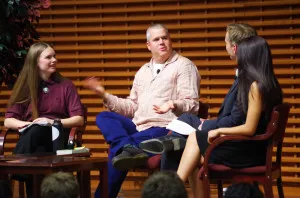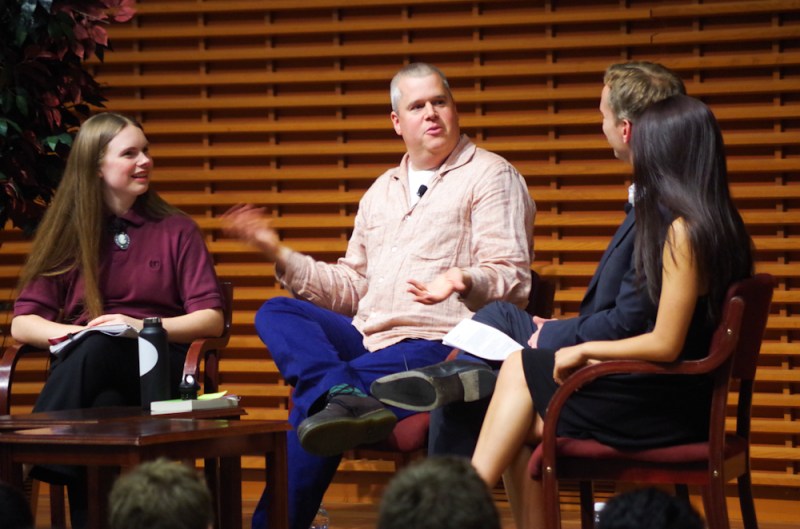“It’s magical to do something when you think no one is going to care.”
That is how Daniel Handler—more commonly known as Lemony Snicket—went into the writing process of his popular children’s series, “A Series of Unfortunate Events.”
Through collaboration between the Stanford Storytelling Project and the Stanford Speaker’s Bureau, Handler gave a talk at Cemex Auditorium Wednesday night.

During the talk, Handler read passages from “When Did You See Her Last?”, the second installment in his “All the Wrong Questions” young adult series, which follows the life of Lemony Snicket as a young man. The author also read a passage from his first novel, “The Basic Eight.”
Three students were given the chance to ask Handler questions about his work at the event. Robin Summers ’16, Aaron Broder ’15 and Ouree Lee ’17 engaged Handler in a question-and-answer session that ranged from topics concerning his writing style to his inspiration for “All the Wrong Questions” to his spirit animal.
Handler told the audience his interest in writing stems from his interest in telling stories. He was inspired to write “All the Wrong Questions” because of his curiosity concerning how Count Olaf, the antagonist of “A Series of Unfortunate Events,” could become the kind of man readers see in the series.
“In ‘A Series of Unfortunate Events,’ Lemony Snicket is a full grown man, with a habit of defining his own words,” Handler said. “Where do you get a habit like that, that you might still have as an adult?”
The noir genre of “A Series of Unfortunate Events” and “All the Wrong Questions” came around because of a parallel Handler noticed between the journeys of a noir detective and a child as he or she grows up.
“It’s like the agenda that adults tell you when you’re growing up because they want to hide something from you,” Handler said. “The noir detective discovers this agenda and wants to pursue it and he’s told to lay off the case and doesn’t like that. That’s childhood too.”
“Children are trying to find their own moral path that’s separate from the moral path assigned to them. They’re hitting adolescence and realizing that everyone’s lying all the time,” he added.
Handler said he finds inspiration for his stories in everyday life.
“I’ll have some idea or see something or an event will strike me in a certain way,” he said. “I’ll string it along immediately and think of where it could lead and where it could go. I think of a story.”
The interaction between the three students and moderator was followed by the audience Q&A session. During this time, Handler gave his views on the importance of plot over character.
This distinction was important for Arielle Basich ’15, a member in the audience who has dealt with the issue of character versus plot importance in her own writing.
“It was a really refreshing look at storytelling and different from how a lot of other people think about it,” she said. “I hate how people think you should know everything about a character.”
During the talk, Handler also discussed his inspiration for “A Series of Unfortunate Events.”
Handler told the audience he came up with the idea for the series after thinking about all of the terrible things that could happen to orphans.
“No one thought it was going to work,” Handler said. “And we were all wrong.”
Contact Josee Smith at jsmith11 ‘at’ stanford.edu.
